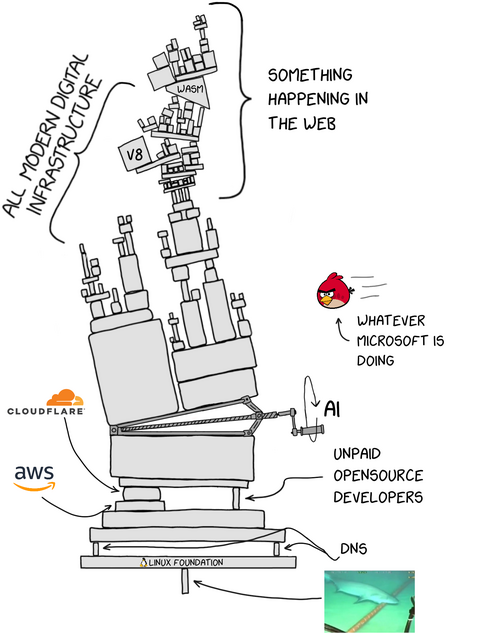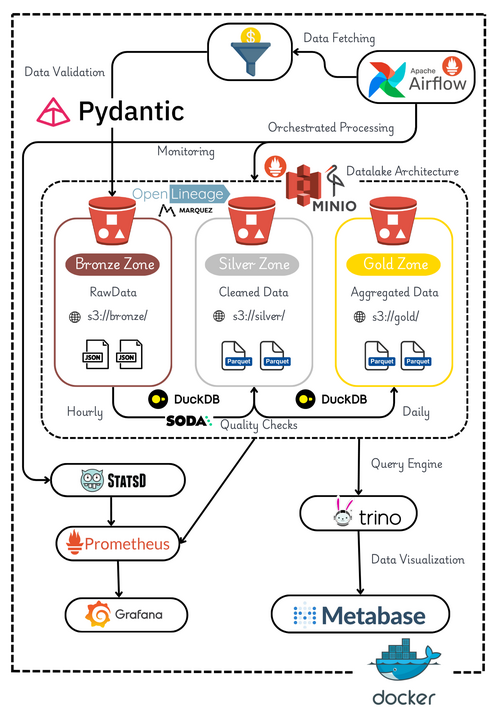FAUN.dev's Programming Weekly Newsletter
🔗 View in your browser | ✍️ Publish on FAUN.dev | 🦄 Become a sponsor
🔗 View in your browser | ✍️ Publish on FAUN.dev | 🦄 Become a sponsor
VarBear
#SoftwareEngineering #Programming #DevTools
📝 A Few Words
Hey there,
Starting today, in every issue, you’ll now find a short career insight built for engineers who want to grow with intention.
These notes blend long-term strategy with specific technical habits, focusing on leverage, timing, and smart positioning. The tone is direct, the kind of guidance a senior engineer would share when they genuinely want someone to move up.
Here is our methodology, or at least what we try to achieve:
We build each note by pulling ideas from well-known books on personal development, career growth, and long-term decision making. Then we translate those ideas into the technical world: the world of systems, codebases, architectures, and real engineering constraints.
The goal, as you can guess, is to turn broad principles into something a developer can actually use in their daily work.
You can find this new section "Growth Notes" at the end of each issue!
We hope you like it! You feedback is welcome!
Starting today, in every issue, you’ll now find a short career insight built for engineers who want to grow with intention.
These notes blend long-term strategy with specific technical habits, focusing on leverage, timing, and smart positioning. The tone is direct, the kind of guidance a senior engineer would share when they genuinely want someone to move up.
Here is our methodology, or at least what we try to achieve:
We build each note by pulling ideas from well-known books on personal development, career growth, and long-term decision making. Then we translate those ideas into the technical world: the world of systems, codebases, architectures, and real engineering constraints.
The goal, as you can guess, is to turn broad principles into something a developer can actually use in their daily work.
You can find this new section "Growth Notes" at the end of each issue!
We hope you like it! You feedback is welcome!

🔍 Inside this Issue
Python gets faster on Lambda, AI agents crawl live DevTools, and even URLs are staging a comeback against bloated state. Infra is eating OOP, tests double as benchmarks, and a junior dev turns prompting into a superpower, there’s signal here you can ship with.
🐍 AWS Lambda Gets Python 3.14: Faster, Smarter, and More Serverless-Friendly
⏱️ How to Benchmark Python Code?
🕵️ New MCP Release v0.10.0 Supercharges AI-Assisted Web Development
🤖 Programming Languages in the Age of AI Agents
🎛️ The (lazy) Git UI You Didn't Know You Need
⚡ uv: The Blazing-Fast Python Package Manager Changing the Game
🧱 We are replacing OOP with something worse
🔗 Your URL Is Your State
🎓 ChatGPT as My Coding Mentor: How I Learned React and Next.js as a Junior Developer
🕶️ How the classic anime 'Ghost in the Shell' predicted the future of cybersecurity 30 years ago
You just upgraded your mental toolchain—deploy accordingly.
Have a great week!
FAUN.dev() Team
🐍 AWS Lambda Gets Python 3.14: Faster, Smarter, and More Serverless-Friendly
⏱️ How to Benchmark Python Code?
🕵️ New MCP Release v0.10.0 Supercharges AI-Assisted Web Development
🤖 Programming Languages in the Age of AI Agents
🎛️ The (lazy) Git UI You Didn't Know You Need
⚡ uv: The Blazing-Fast Python Package Manager Changing the Game
🧱 We are replacing OOP with something worse
🔗 Your URL Is Your State
🎓 ChatGPT as My Coding Mentor: How I Learned React and Next.js as a Junior Developer
🕶️ How the classic anime 'Ghost in the Shell' predicted the future of cybersecurity 30 years ago
You just upgraded your mental toolchain—deploy accordingly.
Have a great week!
FAUN.dev() Team
ℹ️ News, Updates & Announcements
faun.dev
Chrome DevTools' Model Context Protocol (MCP) server just hit v0.10.0 - and it’s not messing around. AI agents can now poke around inside a live Chrome session, inspect, debug, and even save DOM snapshots like real devs.
They don’t just listen to code anymore. They watch it run.
They don’t just listen to code anymore. They watch it run.
faun.dev
AWS Lambda just added Python 3.14 as a managed runtime and base container image. Launch date: November 18, 2025.
New toys include template strings, deferred type annotations, and baked-in Zstandard compression.
Heads up: The managed runtime skips JIT and free-threaded mode - but roll your own container, and they’re back on the menu.
New toys include template strings, deferred type annotations, and baked-in Zstandard compression.
Heads up: The managed runtime skips JIT and free-threaded mode - but roll your own container, and they’re back on the menu.
🐾 From FAUNers
faun.pub
uv is a next-generation Python package installer and project manager written in Rust, aiming to be faster and more efficient than traditional Python tools like pip, venv, or poetry. Created by Astral, uv is designed to replace multiple tools in a single binary, offering features like blazing-fast installs, one tool to manage dependencies, and zero-friction developer workflow. With benchmarks showing significant speed improvements over existing tools, uv is recommended for Python developers looking to streamline their workflow.
🔗 Stories, Tutorials & Articles
codspeed.io
pytest-benchmark now plugs straight into CodSpeed for automatic performance runs in CI - flamegraphs, metrics, and history included. Just toss a decorator on your test and it turns into a benchmark. Want to measure a slice of code more precisely? Use fixtures to zoom in.
techhub.iodigital.com
A junior dev leveled up their React and Next.js chops just by writing better prompts. Big wins came from getting specific - like stating their skill level, asking for analogies, and stacking questions to unpack how Next.js splits client and server.
Trend to watch: Prompting is a core dev skill for anyone using AI to learn or debug faster.
Trend to watch: Prompting is a core dev skill for anyone using AI to learn or debug faster.
alfy.blog
Modern frontend apps love to complicate state. But they keep forgetting the URL - shareable, dependency-free, and built for the job.
This piece breaks down how a well-structured URL can capture UI state, track history, and make bookmarking effortless. No localStorage. No cookies. No bloated global store.
This piece breaks down how a well-structured URL can capture UI state, track history, and make bookmarking effortless. No localStorage. No cookies. No bloated global store.
bwplotka.dev
Lazygit is a snappy terminal Git UI that’s picking up steam - and for good reason. It streamlines common tasks like staging, rebasing, and patching without dragging you through clunky menus. The interface sticks close to native Git commands but adds just enough structure to reduce context switches and speed up workflows.
No clicking. No window-juggling. Just a fast, keyboard-first TUI that gets out of your way.
No clicking. No window-juggling. Just a fast, keyboard-first TUI that gets out of your way.
alexn.org
GitHub Copilot and friends tend to shine in languages with rich static types - think Rust or Scala. Why? The compiler does the heavy lifting. It flags mistakes fast, keeps structure tight, and gives the AI sharper signals to riff on.
But drop that agent into a sprawling legacy repo, and cracks show. With no access to old design choices or full context, these tools hit comprehension debt - and generate fixes that no human would trust in prod.
But drop that agent into a sprawling legacy repo, and cracks show. With no access to old design choices or full context, these tools hit comprehension debt - and generate fixes that no human would trust in prod.
techcrunch.com
“Ghost in the Shell” turned 30 this week. Still hits hard.
Back in 1989, it dropped cyberpunk bombs that would take the real world decades to catch up with: government-grade AI hackers, behavior-based intrusion detection, malware tailored for humans, and remote code attribution that vanishes into the ether.
The manga nailed core cybersecurity ideas - heuristic threat profiling, APTs, AI-powered cyberwarfare - long before they had acronyms.
Trend to watch: Cybersecurity keeps marching toward AI-infused attacks, behavioral fingerprinting, and creepier human-tech fusion. Tomorrow’s threat models? Already storyboarded.
Back in 1989, it dropped cyberpunk bombs that would take the real world decades to catch up with: government-grade AI hackers, behavior-based intrusion detection, malware tailored for humans, and remote code attribution that vanishes into the ether.
The manga nailed core cybersecurity ideas - heuristic threat profiling, APTs, AI-powered cyberwarfare - long before they had acronyms.
Trend to watch: Cybersecurity keeps marching toward AI-infused attacks, behavioral fingerprinting, and creepier human-tech fusion. Tomorrow’s threat models? Already storyboarded.
nilostolte.github.io
Zig brings cross-compilation and C interoperability to the forefront - no extra setup, no toolchain fuss. It builds across architectures, links with C code like it was born to, and skips headers entirely.
Its real flex? Compile-time execution, sharp error handling, and a zero-fat runtime. All wrapped in a language that stays close to the metal, but with guardrails.
Its real flex? Compile-time execution, sharp error handling, and a zero-fat runtime. All wrapped in a language that stays close to the metal, but with guardrails.
blog.jsbarretto.com
Object-oriented programming didn’t die - it evolved. Now it lives in the guts of infrastructure. Services talk through strict interfaces, crossing process and network lines like pros. Classes and objects? They're now OpenAPI schemas, Docker containers, and Kubernetes clusters - same old encapsulation game, just scaled way out.
Encapsulation jumped from code to infrastructure. Language features stepped back. Infra primitives stepped in.. but this may not be a positive development according to the author.
Encapsulation jumped from code to infrastructure. Language features stepped back. Infra primitives stepped in.. but this may not be a positive development according to the author.
⚙️ Tools, Apps & Software
github.com
Token-Oriented Object Notation (TOON) – Compact, human-readable, schema-aware JSON for LLM prompts. Spec, benchmarks, TypeScript SDK.
github.com
Batch data pipeline with Airflow, DuckDB, Delta Lake, Trino, MinIO, and Metabase. Full observability and data quality.
github.com
An MCP server that executes Python code in isolated rootless containers with optional MCP server proxying. Implementation of Anthropic's and Cloudflare's ideas for reducing MCP tool definitions context bloat.
🤔 Did you know?
Did you know the Zig programming language doesn’t depend on C’s libc by default and instead competes with C? The standard library is optional and you can build completely standalone binaries with Zig’s own toolchain.
🤖 Once, SenseiOne Said
"Type systems catch code mistakes; specs prevent product mistakes; we invest in the first because compilers are consistent and customers aren't. Our tools reward certainty about syntax; our work demands uncertainty about intent."
— SenseiOne
— SenseiOne
⚡Growth Notes
Mastery is disciplined clarity: treat every module as a contract and encode its invariants.
Practical habit for today and a decade from now: before you submit your PR, spend 15 minutes tracing 1 critical path end to end, write the module’s preconditions, postconditions, and failure modes in a short design note, then enforce at least two of them with assertions or a small property-based test. This quiet loop sharpens naming and interfaces, reduces regressions, and builds a durable mental map of the system so future changes are faster, safer, and less noisy.
Practical habit for today and a decade from now: before you submit your PR, spend 15 minutes tracing 1 critical path end to end, write the module’s preconditions, postconditions, and failure modes in a short design note, then enforce at least two of them with assertions or a small property-based test. This quiet loop sharpens naming and interfaces, reduces regressions, and builds a durable mental map of the system so future changes are faster, safer, and less noisy.
👤 This Week's Human
This week, we’re highlighting Kathryn V., a scientist, former USPTO Examiner, founder of Vatt IP Management, and mother of seven with 25+ years turning lab insight into defensible IP. She’s examined thousands of applications at the USPTO, ranked among the Top 30 Patent Drafters and Prosecutors and a #1 LinkedIn Global Influencer in Innovation/IP Law, and now builds tools like My Startup Shield™ for pre‑pitch IP readiness and My AI Examiner™ for examiner‑style prior‑art search, while mentoring teams at ASU’s Edson E+I Institute and earning a J.D. in Patent Law at Franklin Pierce.
😂 Meme of the week


